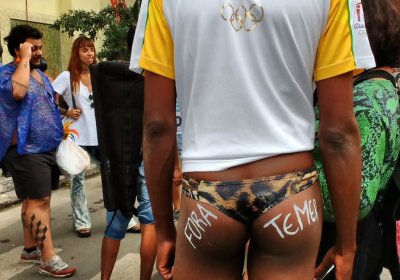Olympic gold medal boxers Imane Khelif and Lin Yu-Ting faced attacks from far-right politicians and anti-trans activists while competing in the Paris Olympics, illustrating how transphobia, racism and misogyny intersect, argues Alex Salmon.
Olympic Games
French President Emmanuel Macron does not plan to appoint a new Prime Minister until at least mid-August and is holding out hope he can cobble together a coalition and block the left from government, writes John Mullen.
Coca-Cola, McDonald's, Visa and the rest of the corporate sponsors of the August 5–21 Olympic Games in Rio de Janeiro won't be paying any taxes on the money they earn due to a tax exemption law that is set to cost Brazil hundreds of millions of dollars.
There is joy in Olympic Rio, make no mistake about it. Maybe it takes two hours to travel 25 miles across the city; and maybe only 15% of the Olympic decorations were delivered; and maybe there are more soldiers on the ground, per capita, than the United States had in Iraq at the height of Bush’s war; but there is joy.
Palestinian swimmer Mary al-Atrash headed to the Rio 2016 Olympics despite the Israeli occupation making the West Bank-based athlete's training extremely difficult.
When the 2016 Olympic Games began on August 5, it was the culmination of a harrowing, exhausting decade-long battle between the people of Brazil and the demands of those utterly unaccountable, scandal-plagued sports bodies, FIFA and the IOC.
Hosting the 2014 World Cup and then the Olympics back to back with one city, Rio, as the epicentre for both events, has never been done in history — let alone in the post-9/11 world. It would be a challenge for any country. Putting these mega-events in Brazil, for those in the West, must seem like madness.







